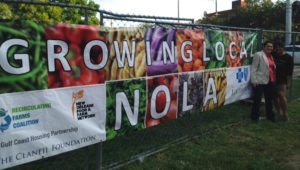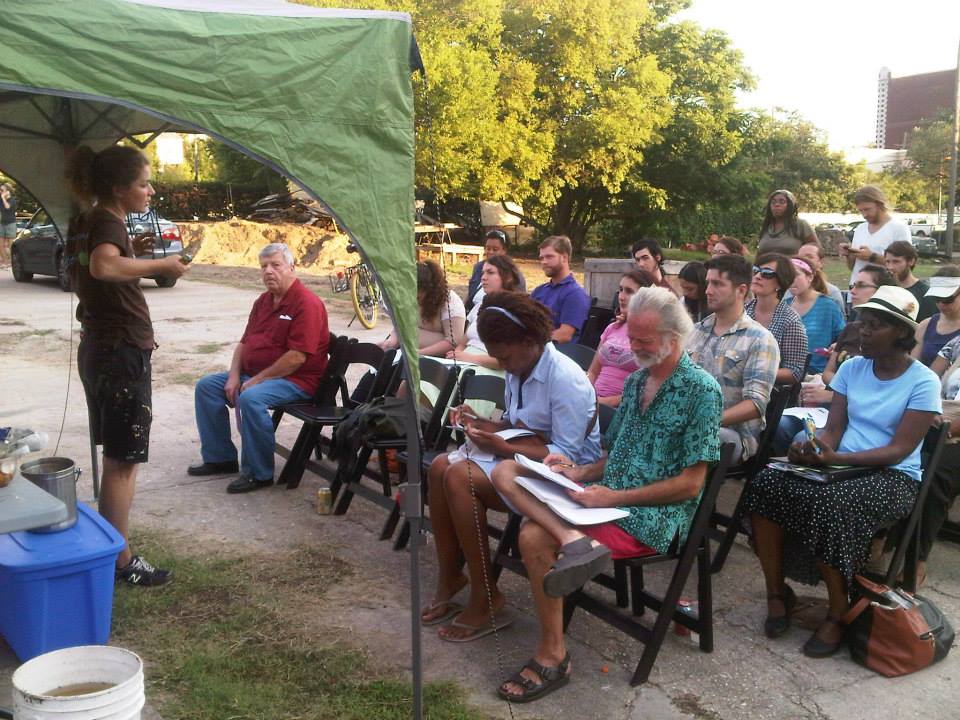
By Tina Dirmann
BCBSLA Foundation Staff Writer
Let’s grow the growers!
That’s a rather cute way of saying, in short, our local farmers need help.

We’re not talking about the mass market farmers that supply most of
our chain grocery stores and major restaurant/fast food outlets. Or the commodity farmers growing bulk amounts of one product (corn, cotton, rice, etc) to disperse across the nation. We’re talking about the small guys, trying their best to offer us a variety of more locally grown products, and, often, organically grown products.
And that need for help is greater than ever today because, after decades of lost interest in buying regionally produced goods, suddenly, eating local is in vogue again. But the small farms that used to meet those demands have largely disappeared from our landscape.
“Not many years ago,” said Marianne Cufone, project director for Growing Local Nola (a Challenge for a Healthier Louisiana grant supported wellness initiative), “the family farmers all but disappeared. It was becoming a dying art. When you said the word ‘farmers’ not too long ago, you imagined old men in some field in the country somewhere. Today, that has changed significantly. There’s a new farming craze, as our eating habits are changing. And suddenly, farming is interesting and sexy. People love it!”
But a complex issue has developed along with that renewed discovery of local foods-n-farming…
“We have the new interest,” notes Cufone, who also runs the Recirculating Farm Coalition , based in New Orleans. “But we’ve lost the skill. And the bottom line is, if we want more good food, we need more good farmers.”
Enter farmer training classes, now in demand across our country. And nowhere more so than right here at home, in Louisiana. In particular, some of our very own Challenge Grant supported programs are driving this movement, hosting a series of successful (and free) farmer training courses, both in rural areas of Central Louisiana and amid the big city streets of New Orleans.
Growing Local Nola, for e xample, held a Market Farmer Training series earlier this month, with another scheduled for September. The workshop, held largely at our grant-sponsored community farming site in the heart of uptown New Orleans, focused on urban farming methods, how to build hydroponic and aquaponic systems, beekeeping instruction, as well as basic business planning (licensing, permits, how to incorporate, where to go for free assistance). The series is one of several held in the past 3 years, since Challenge Grant began.
xample, held a Market Farmer Training series earlier this month, with another scheduled for September. The workshop, held largely at our grant-sponsored community farming site in the heart of uptown New Orleans, focused on urban farming methods, how to build hydroponic and aquaponic systems, beekeeping instruction, as well as basic business planning (licensing, permits, how to incorporate, where to go for free assistance). The series is one of several held in the past 3 years, since Challenge Grant began.
And leaders of the Central Louisiana Local Foods Initiative (another Challenge Grant sponsored program) have held ongoing farmer training workshops, including one-on-one coaching to help small farmers become bigger and new farmers become better. The project is led by Gary Perkins, executive director of the Business Acceleration System, a program for local entrepreneurs run by the Central Louisiana Economic Development Agency (also a Central Louisiana Local Foods Initiative partner). Perkins works with nine area farmers on a regular basis, traveling to their farms for meetings.
“We’re treating these farmers like businessmen,” he said. “Like
entrepreuners. A lot of these folks know how to work outside. But you
try to get them to sit down and write a business plan, you’ve lost
them. They won’t sit in a classroom very long. They have work to do outside, they’ll tell you. But we’re showing them how it’s essential to their bottom line. We tell them, ‘This isn’t your grandma’s farm. If you want to be a successful vegetable farmer, you have to approach it like a
business.’ ”
Later this month, the Central Louisiana Local Foods Initiative team will host a new workshop: How to Grow $5,000 per Season in Your Garden. Last fall, 39 farmers attended the group’s Exploring Your Small Farm Dream workshop series – a six week course, meeting for three hours weekly, teaching not only what to plant and when to plant, but how to make more money doing it.
In every class, the message is a simple one. There is money to be made in your fields — let us show you how…
“Our goal is to make these farmers financially successful,” Perkins said. “I want them to know that with less than 5 acres of land, they can make $75,000 to $100,000 a year. That’s possible.”
Ultimately, he hopes to intrigue enough part time farmers, or experienced backyard gardeners, into taking on the profession full time.

Fredie Manes was one of those beginning farmers attending Perkins’
classes. Manes, a retired marine who started farming just two years ago, said farming was the fulfillment of a life-long dream. He always longed to settle down on a patch of land with his wife, Patricia, build their own home, and farm for a living. Today, he proudly lives in that home, built with his wife in Hornbeck, La, where they also cleared enough pine trees from
a one-acre lot to launch the Swindler Creek Farm. They produce tomatoes, squash, lettuce, cabbage, mustard greens, carrots, okra, to name a few things… And after one farmer workshop, Manes started growing sunflowers to sell, on the advice of a farmer mentor he met.
“Learning the business side of farming was a huge eye opener,”
Manes said. “Before, I used to just plant a big old garden, then
figure out how to sell it. I realize now how backward that was. First,
you figure out your market, then you sell to meet the demand of that
market.”
He also learned the art of seasonal planting, gearing up to plant a
new group of crops as one dies out. Now, his farm is productive all year long.
“Everything I did before was reactionary,” Manes said. “I realized there was a time for everything and suddenly, I was always ahead of schedule. That’s what the classes have done for me. I’ve learned so
much and met other farmers, too.”
The classes have touched a nerve within the farming community, even drawing participants from all corners of the Louisiana. Cufone estimates she’s helped train over 3,000 farmers over the past three years.
“I had one gentleman tell me he drove three hours just to attend my class,” she said.
And on a tip from Perkins, Manes recently drove to Mississippi to attend the Southern Sustainable Working Group Conference.

Both groups have also won praise nationally, earning grants to continue the work from the USDA and the Keller Foundation (totaling well over a half million dollars).
Farming can be a lonely gig, any of the long timers will tell you. But the classes have changed that experience, too, Manes
tells us. In his words, “The classes have really opened doors for me. Suddenly, I don’t feel so on my own.”

